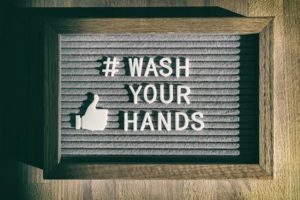Each year, millions of people suffer from colds, flu, or other viruses. Some viruses can spread easily from one person to another. Now more than ever, it is important to take care of yourself and your immune system. Try these tips for protecting your good health, as well as the health of others.
Get a Flu Shot
There are many viruses each year, and each one can affect people differently. The best way to prevent seasonal flu is to get vaccinated annually—and while you’re at it, make sure your other vaccinations (including chicken pox, shingles, and measels) are up to date. Vaccination is especially important for those with chronic health conditions. Other benefits include reducing the severity of illness as well as the likelihood of hospitalizations and flu-related death in children.Wash Your Hands
 Just the simple act of washing your hands often and thoroughly will help protect you from germs. More than any other part of your body, your hands come into contact with your surroundings. Whether you are at your workplace, a store, a bus, or any public place, when you touch a surface, you risk picking up germs. According to the CDC, the flu virus can live on hard surfaces for up to eight hours.
Wash your hands several times a day. In general, wash your hands whenever they are visibly dirty, or after you have come into contact with any questionable surfaces. Make it part of your daily routine. For example, wash your hands before preparing or eating food, caring for someone who is sick, and inserting or removing contact lenses. Also, don’t forget to wash your hands after using the bathroom, sneezing, coughing, or blowing your nose or caring for someone who is sick. Also, wash your hands after handling food (including pet food) or garbage, or touching an animal or animal waste.
The Mayo Clinic recommends washing your hands with soap and water. Regular soap is just as effective as over-the-counter antibacterial soaps to kill germs.
For thorough, effective hand washing, experts recommend:
Just the simple act of washing your hands often and thoroughly will help protect you from germs. More than any other part of your body, your hands come into contact with your surroundings. Whether you are at your workplace, a store, a bus, or any public place, when you touch a surface, you risk picking up germs. According to the CDC, the flu virus can live on hard surfaces for up to eight hours.
Wash your hands several times a day. In general, wash your hands whenever they are visibly dirty, or after you have come into contact with any questionable surfaces. Make it part of your daily routine. For example, wash your hands before preparing or eating food, caring for someone who is sick, and inserting or removing contact lenses. Also, don’t forget to wash your hands after using the bathroom, sneezing, coughing, or blowing your nose or caring for someone who is sick. Also, wash your hands after handling food (including pet food) or garbage, or touching an animal or animal waste.
The Mayo Clinic recommends washing your hands with soap and water. Regular soap is just as effective as over-the-counter antibacterial soaps to kill germs.
For thorough, effective hand washing, experts recommend:
- Use clean, running water.
- Apply soap and scrub your hands thoroughly for 20 seconds or more. Make sure you rub all parts of your hands, including between your fingers, under your fingernails, the backs of your hands and your wrists.
- Rinse completely, and air dry your hands or use a clean towel.
- Use alcohol-based sanitizer
Avoid Touching Your Eyes, Mouth, and Nose
Even if you wash your hands regularly, it is impossible to keep them completely clean all the time. You can’t see them, but germs are everywhere. If you touch something that is contaminated with germs and then touch your eyes, nose, or mouth, you risk infection. Unfortunately, touching your face is a tough habit to break. Those who have habits such as nail-biting risk ingesting germs. When wearing a mask, be sure to follow the recommended guidelines for safe and sanitary use.Keep Your Home, Workspace, and Car Clean and Sanitized
You probably feel that your home, office, or car is very clean. However, we are all touching surfaces all the time. After you have been out in public, you may have gotten in your car, driven home, and along the way, touched your keys, cell phone, and other areas in your home before you got around to washing your hands. Doing so just invited all sorts of germs into your life. Countertops, whether they are in a store or your own kitchen, can be teeming with germs. If you make yourself a snack on a contaminated surface, you will ingest all those germs. Even kitchen sponges harbor germs. They should be disinfected or changed regularly.Avoid Touching Common Surfaces in Public Places
Common public surfaces/places that have the most germs include:- ATMs, PIN pads or other electronic payment terminals
- Gas pumps
- Shopping carts
- Pens used to sign at a store checkout or a restaurant
- Self-checkout terminals at the grocery store
- Doorknobs and handles
- Handles and other surfaces on public transportation
